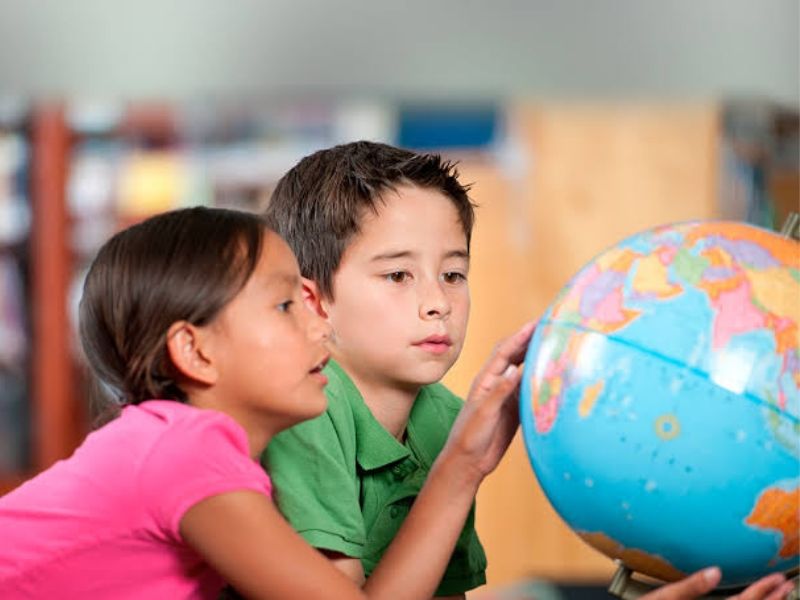No matter what stage of education your child is at, ensuring they get the most out of their school years, whilst enjoying their learning experience, is always a priority. Parents with children entering primary education will be considering the best educational pathway to offer children a good educational grounding. As a child’s first introduction to formal education, primary years education can set a child up for not only academic success at school, but life beyond.
In the primary years, and throughout a child’s school experience, the importance of student agency is becoming increasingly apparent, in India and across the world. Student agency is present when students partner with teachers and members of the learning community to take responsibility of what, where, why, and with whom they learn. When your child’s school encourages student voice, choice and ownership it opens up the possibilities for authentic and engaging learning to take place
Student agency is a part and parcel of the International Baccalaureate’s (IB) Primary Years Programme (PYP), a curriculum framework catering to ages 3 – 12, and offered in 90 schools across India. The PYP focuses on a child-centred approach that builds confidence, creativity and future learning skills, and gives children ownership of their studies, right from the very beginning.
Key attributes of each of the IB’s four programmes include inquiry and concept-based learning which encourage children to take action, and, over the years, the IB has continued to evolve its programmes to enhance these signature qualities and to reflect the latest research in education. Following the first review of the PYP since its launch in 1997, enhancements have been implemented to strengthen the foundations of the existing programme, and a key feature of the update is the reinforcement of the concept of student agency within the programme.
IB’s focus on student agency means that, within in a PYP classroom, children will have many opportunities to demonstrate, build and reflect on their knowledge and their approaches to learning, as well as attributes of the IB’s learner profile (a collection of 10 human attributes that an IB education encourages all pupils to develop). In short, your child will influence and direct their own learning, taking positive and meaningful action, and contributing to the wider learning community. All the while, pupils are supported by highly-qualified teachers that have been equipped with a comprehensive framework for high quality, international education. Through the IB’s pedagogical framework teachers are able to deliver the national or local curriculum in an engaging and challenging way for learners aged 3–12; while being flexible enough to personalise learning for students’ abilities and their local context.
As a parent, you will see on a daily basis the wonderful, creative and valuable ideas and observations your child makes. From a young age, humans are capable of incredible inquisition, and, just as parents naturally encourage this at home, it should be developed in the classroom too. PYP begins with the premise that young learners are competent and have valuable ideas to shape their own learning. The programme fosters social and cognitive skills, and, as a result, we’ve seen students as young as 5 holding morning meetings, planning the day’s timetable, posing sophisticated lines of inquiries and constructing learning theories.
Of course, academic and social development are important attributes of a primary education. But, your child’s happiness is always at the forefront of your mind, and so fun and play is an equally valuable component of your child’s early years schooling. In considering the youngest primary school students, the IB believes in the power of play as the primary vehicle for inquiry, and supports thoughtful and intentional opportunities for child-initiated play, hands-on learning and the co-construction of learning between teachers and young learners. Play offers young students authentic contexts through which to cognitively, emotionally, linguistically, physically and socially learn and develop at their own pace.
Inquiry through play is the first step in building your child’s awareness of the world around them and the local and global issues we face, motivating them to take meaningful action. Guided by six transdisciplinary themes of global significance, the PYP works as a framework, enabling schools to flexibly adapt the programme to reflect different cultures and make learning relevant for students. Incorporating local and global issues into the framework, the PYP asks students to explore the transdisciplinary themes and to consider the links between them. The themes include: ‘who we are’, ‘where we are in place and time’ and ‘how the world works’, reflecting children’s innate curiosity.
The PYP is the beginning of a lifelong love of learning. When children are enabled to take ownership for their own studies, it makes the whole process of learning much more enjoyable. With a framework that nurtures your child’s creativity and future learning skills, the PYP develops young people who are not only academically able, but confident, happy, empathetic and self-motivated to make this world a better place.
For more information about the IB and the PYP, please visit www.ibo.org .
The above article is authored by Nicole Bien, Head of Programme (PYP & MYP), International Baccalaureate
Recommended: Critical importance of first five years
